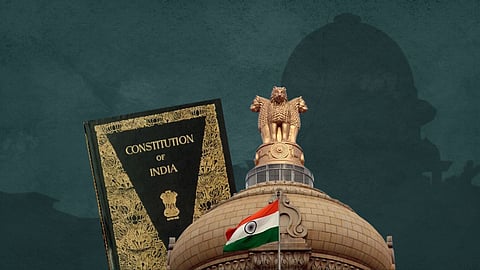

IT WAS A COURTROOM LIKE ANY OTHER. Polished wood, disciplined hush, robes in command. The matter was familiar too, a politician, hauled up for an alleged remark about the Indian Army. Then came an observation that had no place in the order, no basis in the statute, no footing in law. A judge leaned in and said, “If you are a true Indian, you would not say this.”
No one needed to be in the room to feel the chill. Since when did the Court become the custodian of citizenship purity? When did our legal system start requiring moral certification for free speech? Because when judges begin to weigh statements on invisible scales of patriotism, they cross from adjudication into an arena they are sworn to stay out of: political morality.
In the ordinary scheme of things, courts determine legality, not loyalty. Their duty is to protect rights, not administer nationalist catechisms. Patriotism is an internal compass, a matter of conscience and affection. Nationalism, when wielded carelessly, demands allegiance and silence. Patriotism allows questions. Nationalism fears them.
India’s history is filled with people punished in their time, celebrated in hindsight. Bal Gangadhar Tilak was sentenced to six years for writing articles urging Indians to rise. Nehru was arrested again and again for calling out imperial arrogance. In the darkest hour of our democracy, Justice H R Khanna (as he was then) reminded us that being a true Indian means protecting the right to dissent, even if you must stand alone. He did so in ADM Jabalpur (1976), knowing the consequences. None of them passed a patriotism test. They simply passed the test of courage.
We live in the times of oral orders
Perhaps, the remark was off the cuff. Not in the written order. No harm done? Not quite. In courtrooms, especially at the Supreme Court, even words spoken en passant take on weight. They shape public perception, tilt headlines, and plant moral judgments in place of legal reasoning. In Rupa Ashok Hurra v. Ashok Hurra (2002), the Court itself held that parties must not be prejudiced by what lies outside the formal order. But we now live in a media environment where oral observations trend faster than judicial reasoning.
A stray remark can outpace the judgment itself, carried further by headlines than by law reports.
This is not just theory. In January 2024, a judge of the Karnataka High Court described a part of Bengaluru as “Pakistan.” The Supreme Court of India, though it later closed the matter after an apology, stated clearly that such casual commentary by judges “can’t be justified,” especially when unrelated to the issue before the Court. The warning was not legalistic, it was institutional: remarks from the Bench can erode public trust in judicial neutrality.
Demanding declarations of patriotism chill free speech
India is not alone in this experience. In the United States, during the height of the McCarthy era, courts were confronted with laws demanding loyalty oaths from teachers, civil servants, and ordinary citizens. It was the Supreme Court, in cases like Keyishian v. Board of Regents (1967), Speiser v. Randall (1958), and Wieman v. Updegraff (1952), that struck these down. The Court declared that demanding declarations of patriotism chilled free speech and undermined democracy. They reminded the nation that freedom is not a loyalty contest.
Where courts abandon neutrality, democracies weaken. History shows that when judges stop interpreting law and begin reinforcing ideology, justice loses its credibility. In authoritarian regimes like mid-20th century Germany and the Soviet Union, courts often served the state’s agenda rather than the people’s rights. Scholars like Ingo Müller, Robert Conquest, and Stephen Cohen have shown how dangerous it is when courts trade impartiality for partisanship, and the rule of law is replaced by rule by ideology.
Here is where we must be precise. Patriotism is love for a country. It is voluntary, heartfelt, and tolerant of imperfection. Nationalism, especially when enforced from above, demands uniformity. It punishes questioning. It draws lines between “us” and “them.” In 2021, the Madras High Court held that a bakery cutting a cake decorated with the Indian flag was not an insult if done with no intention to offend. The Court reasoned that patriotism could not be reduced to rigid symbolism. The act may offend someone, but that does not make it criminal. This is constitutional patriotism, one that allows room for expression, even if it makes others uncomfortable.
Tagore warned us against blind nationalism. Ambedkar cautioned us to place constitutional morality above all. They understood that patriotism, if not grounded in liberty and pluralism, becomes an excuse for coercion. This is not a call for silence. It is a call for restraint. Judges carry immense moral force. But that force must be channeled through reasoning, not rhetoric. A courtroom is not the place for declarations about who is worthy of the nation. It is where the law speaks for all Indians equally. The Constitution does not require patriotism as a precondition to free speech. The Preamble does not demand nationalism. It asks for justice, liberty, equality, and fraternity. Courts must guard those values, not redefine them.
To be a true Indian is not to chant the loudest slogan or wear the loudest pride. It is to believe in dissent, to defend institutions, and to speak truth to power, whether that power is military, political, or judicial. So let us be Indian. Let us be proud. But let us also be constitutional. Because when the Constitution is strong, no one, not even a judge, gets to decide who is Indian enough to speak.